The Wheatsheaf Inn, Market Place, Woburn
The Wheatsheaf Inn once stood in the Market Place at Woburn, just behind the Town Hall. The site it stood on is now the gap between the modern nos. 20-21 Market Place, so between the Woburn Coffee House and Olivia James, where the Woburn Art Gallery now sits (in 2023). The public house closed about 1868, when it was purchased by the Duke of Bedford and later demolished.
Most of the text here comes from the comprehensive page about the Inn on Bedfordshire Archives’ Community Histories webpage, to which I have added newspaper entries from British Newspapers Online and other mentions of the inn from genealogical websites and the Bedfordshire Archives’ online catalogue.
“The Wheatsheaf” as a name was first used in 1777. Before that, it was known as the “White Lion”. A deed from 1803 erroneously used the name “Black Lion”, which was copied into other legal documents from that point onwards.
Bedfordshire Archives have deeds in their collection that cover 1713 to 1868. In 1713 the building was owned by Jeremiah Rowberd (also called Roobard) and he mortgaged it to Katherine Dodsworth for £200 [R6/63/4/10]. Jeremiah and Mary conveyed the property to trustees, who were to act on their behalf, in 1724 [R6/63/4/1-2] when was described as a messuage in the Corn Market, previously known as the White Lion with a one-acre pightle adjoining on which a malthouse had previously stood but had been burned down “in the late dreadfull fire”, which had occurred three months earlier and destroyed 39 buildings in the town [R6/63/4/1-2]. There is no indication that the building was a licensed premises at this date. In 1731 the mortgage to Katherine Dodsworth was transferred to Thomas Cooke [R6/63/4]3.
Jeremiah died in April 1735 and devised the premises to his wife Mary in his will, the intention being that, after her death, it would be sold and the money divided between their children Jeremiah, Robert, Margaret, Elizabeth and Anne. In October 1739 the trustees released the property to Mary with the consent of her children [R6/63/4/4]. the following November Mary sold part of the building, but not the adjoining pasture, to her eldest son, Jeremiah of Woburn, grocer for £155 [R6/63/4/6-7]. The property was described as a messuage in the Corn Market with half the gateway and yard “from the stump that the gate there shuts against up to the orchard pales on that side” and was part of the former White Lion. The other half of the former White Lion, together with the land, now called an orchard, was sold to John Ireland of Woburn, maltster, for £310 and was, at that stage, the shop of the barber surgeon Francis Timbs, who had died a few months before [R6/63/4/8-9]. On the same day the mortgage of 1713 which was still owing to Thomas Cooke was assigned by his widow to John Ireland [R6/63/4/10], it now stood at £165 and had been included in the sale price of £310 Ireland had paid to Mary Rowberd.
At the time of John Ireland’s death in 1770, the inn was being run by a Mark West. This is recorded in a press advert inviting anyone owed money from, or who owed money to, his estate to meet at “Mr. Mark West’s, the Wheatsheaf, in Woburn”. (Northampton Mercury 23rd July 1770)
John Ireland’s part of the former White Lion was conveyed by his children Catherine Durrant, Susannah Tims and Mary Coles, with their respective husbands and his granddaughter Elizabeth Horwood and her husband to John Gostelow, a Woburn victualler in 1777 for £300 [R6/64/4/18-19]. It is in this document that the name Wheatsheaf is used for the first time as successor to the former White Lion.
Jeremiah Roobard the younger went bankrupt in 1740 whilst carrying on the trade of tallow chandler and his creditors sold his part of the former White Lion to George Carey, a grocer and tallow chandler from Olney [Buckinghamshire] in 1741 [R6/63/4/12-13]. George’s son Robert willed the property to his executors in 1777 [R6/63/4/20] and in 1782 it was conveyed to another Robert Carey, a surgeon of Woburn for £250 [R6/63/4/21-22]. Seven years later Carey sold it to John Gostelow for £260 [R6/63/4/25] thus reuniting the two halves of the former White Lion. Though half the property had been called the Wheatsheaf from 1777 the half sold by Carey in 1789 was not so called.
The Northampton Mercury of 21st June 1784 has an advert from David Willis of Leighton Buzzard, an agent for the Royal-Exchange Fire-Office, to say that he would be attending the Wheat-Sheaf Inn in Woburn every Friday to attend to business.
John Gostelow willed his real estate to his wife Mary in 1791 (proved 1792) [R6/63/4/27] and when she died in 1799 administration of her estate was granted to her brother-in-law James Gostelow [R6/63/4/28] because her eldest son John was a minor, becoming 21 on 10th February 1801 when he mortgaged the Wheatsheaf (with a newly erected malthouse) to his uncle James for £403 [R6/63/4/30]. This was still only part of the building (the western half) because a few months later Gostelow mortgaged the other half, still a private residence, to John White of Westoning for £150 [R6/63/4/31]. Both mortgages were transferred to Thomas Battams of Turvey in 1802 [R6/63/4/32].
It appears that John Gostelow jnr. first tried running the inn himself, but soon installed one George Bull as landlord.
WHEAT-SHEAF INN, WOBURN. GEORGE BULL begs leave to inform the Gentleman Travellers and the public in general, that he has taken and entered upon the above inn, late in the Occupation of Mr. John Gostelow, and he hopes for a Continuance of their favours; assuring them that he has laid in a stock of choice old WINES and SPIRITOUS LIQUORS, of the best Quality; with good BED and STABLING. Every Attention will be paid to render those comfortable who wish to honour him with their commands. N.B. MALT and HOPS, Wholesale and Retail on the most reasonable Terms. Woburn, March 10th, 1802. (Northampton Mercury 13th March 1802)
The property was assessed for £3 2s. tax in 1802.
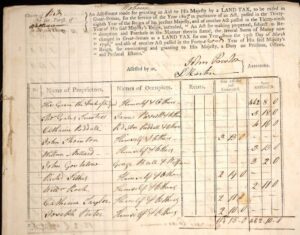
Gostelow sold the Wheatsheaf in 1803 to Francis Ireland of Spitalfields, Middlesex. [R6/63/4/38-39]. This document mistakenly refers to the Black rather than White Lion. The mistake may arise from the fact that, by that date, another White Lion existed in Park Street and the clerk drawing up the deed assumed that reference to a White Lion (closed for at least 79 years) was itself a mistake.
After two years, in March 1804, George Bull left the Wheatsheaf and took on the George Inn (now “The Woburn” in 2023), taking over that business from a James Martin and staying there until his death in 1811.
The Wheatsheaf deeds include a tenancy agreement of 1804 [R6/63/4/40] showing that Francis Ireland then leased the Wheatsheaf to a William Hurley of Woburn, a plumber, for 14 years at £52 per annum rent, with Hurley agreeing to buy all his liquor from the Wheatsheaf brewery, also owned by Ireland, behind the pub. The Wheatsheaf must have come fully-furnished as Hurley had to hold a sale of all his existing household goods in May 1804:
To be SOLD by AUCTION by ANDREW GARDNER. On the premises on Wednesday the 23d day of May 1804 and the following day. All the genteel and useful HOUSEHOLD FURNITURE, LINEN, CHINA and other EFFECTS of Mr. William Hurley, plumber and glazier of the High Street, Woburn, Beds. (He having taken an entered on the Wheatsheaf Inn)… (Northampton Mercury, 19th May 1804)
… and announcing his new business venture the same day:
WHEAT-SHEAF INN, WOBURN, BEDS – WILLIAM HURLEY respectfully informs the Inhabitants of the said Town and its Vicinity, and the Public in general, that he has taken and entered upon the said Inn, late in the occupation of Mr. George Bull, where he hopes for a Continuance of the Favours so liberally bestowed by the Public on the said Inn, and they may depend, he will use his utmost Endeavours to merit the same by paying every Attention to the Comforts of those who may honour with their Custom. – Good Beds, Wines and Liquors of the very best Quality; likewise good Stabling for about 40 Horses. W.H. continues the PLUMBING and GLAZING BUSINESS as usual and returns his sincere Thanks for the favours he has received in the above Line and solicits a Continuance of the same. Woburn, May 4th, 1804. (Northampton Mercury 19th May 1804)
1807 saw the first auction sale conducted on the premises that I can find reference to. Local auctioneer Andrew Gardner sold a freehold estate at Aspley “at the Sign of the Wheat-Sheaf in Woburn.” (Northampton Mercury, 31st January 1807)
Ireland then sold the Wheatsheaf to landlord Hurley in 1809 for £995 [R6/63/4/42-43]. Hurley mortgaged it for £700 [R6/63/4/44], the mortgage being redeemed in 1825 [R6/63/4/54]. The inn was used for further auctions, not only of land and property, but there was also a large sale of 1200 yards of lace in 1810 with 1000 yards of ribbon etc. (Northampton Mercury, 18th August 1810) It was also used for creditors meetings in 1811, such as that for William Hodgkins in January, the local carrier, who must have gone broke.
Yet Hurley had the inn and malt house up for sale again by 1813, just four years after buying it, as he was “retiring from the business”.
The WHEAT SHEAF INN, Woburn, Beds. To be SOLD by PRIVATE CONTRACT. ALL that substantial FREEHOLD Brick-built INN called the WHEAT SHEAF, situated in the MARKET SQUARE of WOBURN, and which has been more than a Century established as a Traveller’s Inn, and now in full Trade; comprising seven Attics, seven genteel Bed-Chambers, three good Parlours, with a convenient Bar, Taproom, Kitchen and Pantry. Extensive Cellarage and Ostlery, Stabling for 50 Horses, with Corn, Hay and Straw Lofts. Barns, Piggeries, and large Yard and Garden.
Also a very excellent Brick-built and old accustomed Malt-house and a Pightle of Pasture Ground adjoining the Yard.
Proprietor is retiring from the Public Business and Possession may be had immediately. Part of the Purchase-money may remain on the Estate. The Furniture and Stock to be taken at a fair Valuation. For a View, apply to the proprietor, Mr. WM. HURLEY, on the Premises and further Particulars may be had at the office of Mr. Day, solicitor, Woburn. (Northampton Mercury 27th March 1813)
But this first attempt in March was postponed until September, yet it did not sell. Did Hurley withdraw it or were there no takers? He must have been a successful business man to be able to change a £100 note… Northampton Mercury 23rd May 1818:
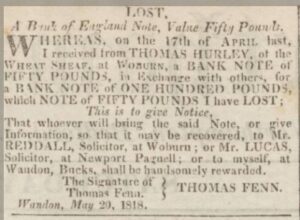
William Hurley devised the Wheatsheaf in his will of 1817 (when he describes himself as plumber, glazier, painter and innholder) to his wife Maria [R6/63/4/46], though if she wished to give up the business, she was to give their son Joseph first refusal before selling it. Hurley died in 1821 and his wife duly continued to own and run the Wheatsheaf. Northampton Mercury 21st April 1821:
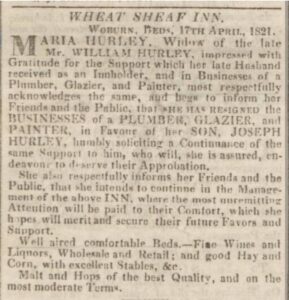
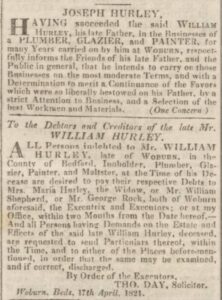
In March the next year, Joseph Hurley moved out of the Inn to his own, larger, premises. Northampton Mercury 10th March 1832:
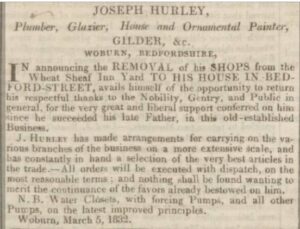
At the Bedfordshire Quarter Session of 29th March 1832, the following case was heard:
Depositions of Maria Hurley, widow of Woburn. In the case of John Eaton, accused of stealing a pint and a half of gin.
Maria Hurley: landlady of the Wheatsheaf at Woburn. On 26 March John Eaton worked for Mr Robert Taylor Cooper of Woburn and was employed in her beer cellar to clean a barrel. During the time he was there she went in to the cellar adjoining the beer cellar, where she kept the spirituous liquors. She examined the taps of the liquor casks and found all to be right. She had to go through the beer cellar to get to the liquor cellar. The door which opened in 2 parts, she bolted once but did not lock the other as the key was broken. She shut the door was a bang. She afterwards went to the cellar and saw Eaton coming from the liquor cellar door which was open. She asked him why it was open and he said he knew nothing about it. She took the candle out of his hand and went into the liquor cellar. She found the Brandy tap and the Gin tap leaking and there was a puddle under both. There had been no puddles when she went in there before and she found part of a candle in the puddle of Brandy. She accused Eaton of having been at the Brandy and Gin but he said he was sure he had not and then she searched the beer cellar with a candle in her hand. On top of the beer barrels she found a velvet jacket and in the pocket of it was a wine bottle filled with gin and without a cork. The jacket belonged to John Eaton. He told her to give him the jacket. She said she would take it upstairs and ordered Eaton out of the cellar. Eaton went up the stairs into the bar and said to her “pray don’t hurt me I did it to do my children good” There was more than a pint and half of gin in the bottle, which was 2 shillings and 6 pence. She had shut her liquor cellar door with a bang because it made it more difficult to open.
Statement of the accused: he did not know how the bottle had got in the jacket pocket. [QSR1832/2/5/12]
The Northampton Mercury of 15th February 1834 reported that on the Tuesday before, Mr. H. R. West, the saddler of Woburn, had married Miss Maria Hurley, eldest daughter of the late William Hurley of the Wheat Sheaf Inn. With her son moved out to Bedford Street and eldest daughter now married off, perhaps Widow Hurley decided to downsize; first their house went (Northampton Mercury 2nd August 1834):
To be LET. WITH IMMEADIATE POSSESSION. An excellent, substantial HOUSE, containing seven rooms, with large shop and good front, well calculated for any kind of business, together with a garden, situated in the central part of the town of WOBURN, in Bedfordshire. Particulars may be had by applying to Mrs. HURLEY at the Wheat Sheaf Inn, Woburn. (If by letter, post paid.)
…then a year later the inn itself was up for sale again. Northampton Mercury 26th September 1835:
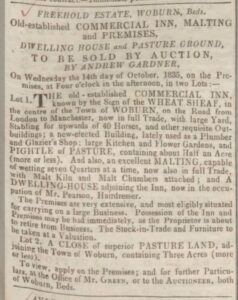
It didn’t sell until 1836, to another William Hurley, this one of Newmarket, a grocer [R6/63/4/51-52] – possibly a relative of her late husband. With the new owner so far away, who would run the inn? Help was on hand from the new husband of the Hurley’s youngest daughter, Lucy who had married in April…
On the 23rd ult. at Woburn, by the Rev. H. Hutton, Mr. O. B. Croxen of Bedford, youngest son of Mr. W. B. Croxen, of Kingsthorpe Mill, to Lucy, youngest daughter of the late Mr. Hurley, of the Wheatsheaf Commercial Inn, Woburn, Beds. (Northampton Mercury 14th May 1846)
…And whose new husband took on the inn in June:
WHEAT SHEAF INN, WOBURN, BEDS, June 24th, 1836. M. Hurley (widow of the late WM. HURLEY), begs to acknowledge to the public her gratitude for the very liberal support to the above Inn, for the last 35 years, and to inform them that she now retires, and also begs to introduce her son-in-law O. B. CROXEN who succeeds her, and whose wife has had the principal management of the business of her establishment.
O. B. C. on entering the above, begs respectfully to inform his friends and the public that nothing shall be wanting to render his establishment in every respect the Traveller’s home. N.B. MALT and HOPS on the most reasonable terms. Stabling and Boxes for Hunters. (Northampton Mercury 2nd July 1846)
Sadly, Oliver Baker Croxon didn’t live very long to enjoy his new business. After being listed in the 1839 Pigot’s Bedfordshire Directory under Woburn as a “Brewer, Maltster and Taverns & Public Houses”, he died aged just 25 (not 26 as some papers recorded it) in 1840, after “a long and severe affliction”, according to the Bucks Advertiser. Again, the inn reverted to a widow’s hand, who advertised the inn with an interesting selection of her wholesale prices in the Northampton Mercury of 22nd February 1840:
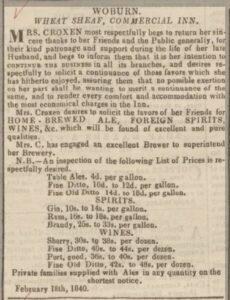
But before the year was out, another name appeared as landlord, that of George Attwood. He brought with him the name of his old public house business in nearby Bedford Street (that had just closed down) and which he tried to amalgamate with the Wheatsheaf’s… From the Sun (London) 21st October 1840:
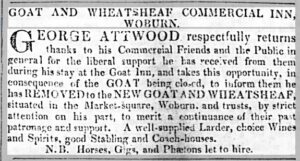
Attwood had another amalgamation on his mind too. Lucy Croxen had not moved out – Attwood had married her!
15th at Woburn Church, by the Rev. H. Hutton, Mr. George Attwood, of the Goat Inn, Woburn Beds, to Lucy, widow of the late Mr. O. B. Croxen, of the Wheatsheaf Inn Woburn. (Bucks Herald 31st October 1840)
However, his idea of a new name for the inn of the “New Goat and Wheatsheaf” didn’t stick and subsequent news reports reverted to just The Wheat Sheaf again, as when a boy in Attwood’s employ was charged with firing squibs (fireworks) in November 1840. Although they were proved to be in his possession, the Police could not prove he had set fired any so he was… let off. (!) (Bucks Gazette 14th November 1840)
1841 brings the first Census with individual names on. Attwood and his family are listed under George Street:
George Atwood, 30, Innkeeper, born Bedfordshire
Lucy Atwood, 30, Bedfordshire
Elizabeth Davis, 20, barmaid
???s ???, 35, grocer
Wm. Bank, 25, wine merchant
Henry Strange, 35, traveller
Elizabeth Bolton, 20, servant
Elizabeth Smith, 25, servant
Susan Griffiths, 20, servant, Bedfordshire
Sarah Hughes, 25
Robert Hutchins, 40
Abraham Studds, 20, servant, Bedfordshire
Phil F. Cayley, independent means, 60
Mary A. Cayley, independent means, 25
By that summer, the inn was up for sale again. Northampton Mercury 12th June 1841:
WHEAT SHEAF, COMMERCIAL INN, WOBURN, BEDS. TO BE SOLD BY PRIVATE CONTRACT. THAT old- established and well-frequented FREEHOLD INN, situated in one of the most eligible parts of Woburn possessing every internal and external convenience, with stabling for 60 horses and large yard, kitchen garden and paddock, together with a field of grass land lying contiguous to the town containing about three acres; also a malting on the premises adjoining the inn; also a good dwelling house and shop. For further particulars and to treat for the same, apply, by letter post paid, to Mr. Joseph Hurley, plumber &c., Woburn, Beds; or to Mr. H. R. West, Saddler and Harness-maker Winslow. (Northampton Mercury 12th June 1841)
It was finally transferred in 1842 when the owner William Hurley of Newmarket sold his Woburn premises, together with a newly erected private house, formerly used as part of the Wheatsheaf, the orchard, Barn Close, of three acres, and a slip of land near the workhouse in 1842 to one William Edward Rogers Freeman of Woburn, druggist, for £1,775 [R6/63/56]. This was not the end of the Hurleys involvement in the Wheatsheaf story, as it appears now Joseph Hurley, the brother of Lucy Attwood (nee Hurley) took over. Northampton Mercury 1st January 1842:
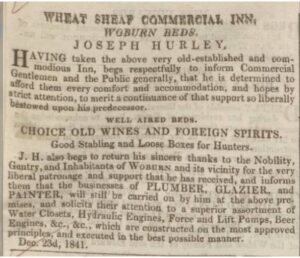
The Woburn Heritage Bedfordshire Facebook group kindly provided this image of the front of the Town Hall in 1842, which shows the original Wheatsheaf Inn to the right, with its swinging signboard above the door, with approximately the same view from 2019 showing the gap it left:
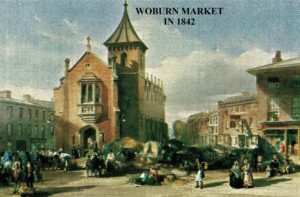
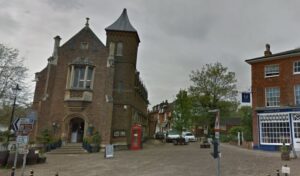
But Joseph Hurley’s tenure only lasted a matter of months before his business was declared bankrupt. Northampton Mercury 23rd April 1842:
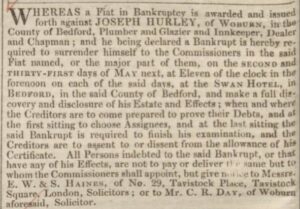
Quarter Session Records from June 1842 which show that Joseph had written to them asking to be excused his Jury duty, due to “the inconvenience it would cause due to his situation under bankruptcy.” The Sheriff’s Officer William Smith wrote back that it was out of his power. [QSR1842/3/2/3 – 26th June 1842]
A sale had been held at the Wheatsheaf in May of the stock and trade of a plumber, glazier and painter by order of the assignees, but the inn fixtures do not seem to be included apart from brewing plant and large and small beer casks, (Northampton Mercury 28th May 1842) then his dwelling house and shop premises were put up for sale by his Assignees in October (Northampton Mercury 15th October 1842)
Despite Hurley’s woes, someone was running the inn. A feature of it was the large assembly room attached to it, no doubt used for the auction sales etc., but also for evenings of entertainment such as this in 1842:
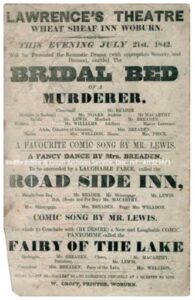
WHEAT SHEAF COMMERCIAL INN, WOBURN, Beds. GEORGE ROGERS takes this opportunity of returning his sincere thanks of the liberal support he has received during a residence of fourteen years at the White Bear, and begs most respectfully to acquaint commercial and other gentlemen, and the public generally, that he has taken and entered upon the above old established and commodious House, situate in the MARKET SQUARE, where he hopes to receive a share of that patronage and support which it will ever be his study to merit. March 13th, 1844. (Northampton Mercury 16th March 1844)
The Bedfordshire Quarter Sessions Records of 17th April 1844 show that a John Green was charged with stealing 2 pairs of leathern gaiters, value 8s., from John Isaac Stapleton at Woburn on 23rd March 1844. Stapleton of London Colney, Herts., was a glover, breeches and gaiter maker who often went to markets and fairs and about the country generally to sell his goods after he has made them. He was at Woburn fair day with a bag of gloves, gaiters, and leggings. He went to the Wheatsheaf public house and into the tap room where there were nearly 20 people sitting. He offered his goods for sale, having one pair of leggings on his arm and two pairs of gaiters in a piece of paper. Whilst one person in the room tried on the leggings, he laid the paper with the gaiters down on the table while he helped the man try on the leggings. When he turned round for his parcel it was gone! All present denied having it. He went to the local policeman. James Wild of Woburn, police constable said he went to the Royal Oak public house kept by Richard Surtees and enquired if Surtees had bought a pair of short gaiters. Surtees said he had. Surtees’ wife gave them to him. Surtees said he bought them from John Green for a shilling and a pint of beer. That evening he went to Green’s house and asked Green where he got the gaiters from. After a little hesitation Green said he bought them and another pair from a man whose name he did not know on Woburn Fair night between 10 and 11pm. Green said the man met him in Back Lane and he gave the man 4s 6d for them. He enquired for the other pair. Green fetched them from upstairs. Last Monday night Green told him he bought the garters in his own house. The paper produced was given to him by Richard Surtees. Surtees said the gaiters were wrapped in the paper when he bought them. Richard Surtees of Woburn, victualler of the Royal Oak public house, said Green had said he had two pairs of gaiters and would sell him on. Green left and soon returned with one pair of short leathern gaiters which he bought for 1s. and a pint of beer. John Green said “I bought the gaiters along with my wife on the Fair day at night in my own house. I have got nothing else to say. I don’t know who I bought them off. I gave 4/6 for them.” [QSR1844/3/6/3]
Another event at the Assembly Rooms was the spectacle of hypnosis. The Northampton Mercury of 13th July 1844 ran this report of a recent performance there:
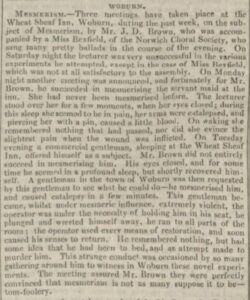
Gambling was common, but illegal, in public houses, but I don’t recall such stakes being played for before! Northampton Mercury 2nd March 1850:
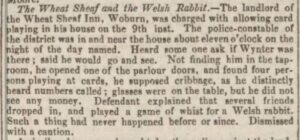
Rogers stayed as landlord until 1850, being replaced by William Norris, according to the Licensing committee report in the Bucks Advertiser of 30th November. The next year, it was census time again:
William Norris, Head, 25, Inn keeper, born in North Crawley, Bedfordshire
Catherine Norris, Wife, 24, Bedfordshire
Mary Ann Randell, Visitor, Unmarried, 15, Visitor, Barton, Herefordshire
Hannah Haydon, Servant, Unmarried, 16, House servant
Sarah Haydon, Servant, Unmarried, 23, House servant
Thomas Gurney, Servant, Unmarried, 22, Bedfordshire,
James Henson, Lodger, 40, Hosier, Leicestershire,
Mary Henson, Lodger, 45, Wife, Whitwick, Leicestershire
…and in May that year, Mr. J. J. Ewart, the polyphonist, gave a grand entertainment of ventriloquism at the Wheat Sheaf Assembly Room. (Beds Mercury 10th May 1841)
The Bedfordshire Quarter Sessions had another case concerning the inn during July 1851: Depositions. Joseph Burnidge and Thomas Shaw, labourers of Woburn, John Quilty & Thomas Worsley, police constables. In the case of: William Capp, Charles Webb & James Atthews accused of stealing 7 live fowls, and a live drake.
Joseph Burnidge: was in the employ of Mr Freeman, a grocer of Woburn. Mr Freeman kept fowl in a building at the top of the gated Wheat Sheaf yard. There is no thoroughfare and the public have no business beyond the gates. Burnidge looked after the fowls. On 26th April around half past 6, he knew the fowls to be there. On leaving the yard, he saw the prisoners, who he knew going into the Wheat Sheaf Tap. On the following morning, he found the door to the fowl house broken and seven of the fowls and a drake missing. He went with the police constable Quilty, and Shaw (an employee of Mr Freeman) to the prisoners house in Little Brickhill. Webb was there. Burnidge stayed outside whilst Shaw & Quilty searched the house. When Capp & Atthews also arrived at the house, Burnidge went inside too. He was shown by Shaw a picked fowl and a drake wrapped in a cloth which appeared to be wet. The policeman said they had been found under the staircase. They all assisted in taking Capp into custody and in the scuffle Atthews got away. Capp & Webb were taken to the lockup at Woburn. Burnidge returned to the prisoner’s house with Quilty and Worsley to search it again. More fowls and a drake were found under floor boards. [QSR1851/3/5/4b-6b]
Norris found himself in trouble when he allegedly refused to admit a Policeman to his house at 5mins after midnight in November 1851. He was taken to Court but had a good explanation, which was sadly not reported in the Northampton Mercury that covered it! Case withdrawn on his paying the 5s 6d. costs and promising to comply in the future. In 1852, the Leighton Buzzard Excise officer, Mr. Babbage, was driving out of the Wheat Sheaf yard “at a furious rate” whereupon his cart turned over, the horse fell down and he was thrown out. He banged his head badly and was taken back into the inn where it took him until the next afternoon to recover. (Bedfordshire Mercury 3rd April 1852)
Bedfordshire Quarter Session Records, 31 May 1852: Depositions of William Jenkins, labourer of Aspley Guise, Francis Tear, singlewoman of Woburn, Ann Cannard, of Woburn, and John Quilty, police constable.
In the case of William Marriott, accused of stealing £1 7s. 7d.
William Jenkins: both he and the prisoner lived in Aspley Guise and were labouring men. They had known each other for years. Both had been working together on Mr William Goodman’s farm at Eversholt, draining for the Duke of Bedford. On 29th May they attended the office at Park Farm Hill to receive their wages. Jenkins received 19s. and 6d, and he also had a shilling and sixpence in his pocket, and 7d. worth of half pennies. He put the silver all together in a purse. After receiving their wages Jenkins, Marriott and other men went to a beer shop in Woburn where they had some beer. The prisoner and Jenkins then went on to the Wheat Sheaf where they took more beer. Jenkins fell asleep in the company of Marriott. On waking, he asked one of the serving girls in the Wheat Sheaf it all the beer was paid for and she told him yes. The prisoner was not in the room. He then went to Mr Steer’s butcher shop in Woburn to pay his bill. He missed his purse. He went to enquire of his mates and the serving girl at the Wheat Sheaf, who said she thought his mate had taken something from his pocket whilst he was asleep. He found the prisoner at the Black Horse inn and asked him to go with him to the Wheat Sheaf, which he did without hesitation. The prisoner was identified by the serving girl and Jenkins asked Marriott for his money. Marriott said he did not have the money and went to leave, Jenkins collared him, and Marriott struck him in the face. A man who was there collared the prisoner and called the police.
Francis Tear: a cook at the Wheat Sheaf in Woburn. The prisoner and Jenkins came to the Tap room alone and appeared to have been drinking. They had some beer and Jenkins fell asleep. She saw the prisoner take some halfpennies out of Jenkins hand and pay for the beer with it. She then saw the prisoner put his hand in Jenkins’ pocket and take something out and put it in his own pocket. Marriott remained a further 10 minutes before leaving.
Ann Cannard: a housemaid at the Wheat Sheaf. She saw the prisoner and prosecutor come into the Tap Room and they had 2 pints of beer together. The prisoner paid her for it. She saw him take money out of the prisoners hand whilst he was asleep. She also saw him take something from Jenkin’s pocket and put it in his own. The prisoner left the prosecutor asleep.
John Quilty: took the prisoner into custody and found 20s. worth of silver and 7d. in coppers on him. He asked him if he had ‘any money away’ and he said he had given a shilling to Jack Page.
Statement of the accused – claimed he was not guilty and that was all he had. [QSR1852/3/5/30]
Bedfordshire Quarter Session Records, 27th October 1852: Depositions of Richard Labrum, letter-out of threshing machines and Elizabeth Sayell, widow of Leighton Buzzard.
In the case of William Creamer accused of obtaining by false pretences a pint of beer, a pennyworth of bread and cheese and a pennyworth of tobacco.
Richard Labrum: lived at Heath and Reach and let out threshing machines. On 23 October he was at the Boot public house in Leighton Buzzard, kept by Mrs Charlotte Gandy. She advised him that one of his men had been into the house the previous day and had a pint of beer, a pennyworth of bread and cheese and a pennyworth of tobacco in his name. He told her that his men were at work in Bickerings Park (10 miles from Leighton) and therefore could not have been at her house for beer. He had never employed the prisoner or authorised he have anything in his name. He did know of the prisoner, as he had worked for farmers with the threshing machine, but never for him. He was also told by Mrs. Norris, of the Wheat sheaf in Woburn, that a pot of beer had been taken in his name on 6 October by a man named Creamer. He did not authorise Creamer to have the beer.
Elizabeth Sayell: resided with her sister Charlotte Gandy, a widow, at the Boot public house in Leighton Buzzard. She would occasionally serve in the bar. On 22 October, the prisoner who she knew nothing of came and asked for a pint of beer, a pennyworth of bread and cheese and a pennyworth of tobacco. He said he was working for Mr Labrum and it was to be charged to him. Mrs Gandy asked him, in her presence, if that was correct and he said ‘yes’. Mr Labrum was known to her and so she allowed the prisoner the goods without payment. The following day she informed Mr Labrum of the circumstance and he said he had authorised nobody to use his name. Statement of the accused: nothing to say.
Francis Tear: a cook at the Wheat sheaf Inn at Woburn, kept by William Norris. On the evening of Woburn Fair, 6 October, William Creamer came into her master’s tap room and called for a pint of beer. She served him and waited for the money, but he said that Mr Labrum had told him to have 2 pints and that he would pay for it. There had been some of Mr Labrum’s men in the house and the prisoner had been drinking with them so she thought it to be alright. The prisoner had the second pint of beer. When he later asked Mrs Norris for more beer, she would not let him have any. He said to her “I have been at work for Mr Labrum, he’s my master and he’ll pay for it”. Mrs Norris would not allow him more and he went away.
Richard Labrum: lived at Heath and Reach and let out threshing machines. He had never employed the prisoner or authorised him to have beer, or anything else, in his name. Statement of the accused: he said that he did not ask for any more beer after he had taken his second pint. [QSR1853/1/5/5a & b]
Norris moved on, but the only references to the next landlord, Joseph Smith Cook, are a reference to his wife and a mention of the inn in his later obituary. He was also Master of the Union Workhouse in Woburn. The Dunstable Chronicle reported on 23rd August 1856 that his sister-in-law, who was 59, had been staying with them and went out for a walk. She was seen sitting on a stile being very sick and asked passers by to fetch her water. By the time they returned she had died. A mention of Jospeh Cook having previously been the Wheatsheaf landlord and 18 years master of Woburn Union Workhouse was made in his obituary (Beds Mercury 9th May 1863) He died at the Carpenter Arms in Windsor, which was then run by his son-in-law.
Cook could not have run the Wheatsheaf for long as the owner, Mr. Freeman was looking for a new landlord in the Morning Advertiser of 31st December 1857:
TO be LET, and entered on immediately, the old-established MARKET and COMMERCIAL INN, WHEAT SHEAF Woburn, Beds, with or without a seven-quarter malting – extensive stabling and premises, a good Corn and Flour trade has been carried on. Apply to Mr. FREEMAN, Woburn, Beds.
… and again at the end of the next year as far away as the midlands. Leicester Advertiser 13th November 1858:
TO BE LET, the WHEAT SHEAF Commercial INN Woburn, Bedfordshire, with extensive stabling, coach houses, brewhouse & c., with or without a seven-quarter malting. Apply to Mr. FREEMAN, Woburn, Bedfordshire.
… and it was also Freeman, rather than any landlords name, that the local Magistrates Bench directed to stop using a Bagatelle Board in the house in August 1860, presumably to cut down on gambling? (Beds Times 28th August 1860)
In the 1861 census, only one Innkeeper is listed under “Market Square, Woburn” but there is no inn name to confirm that Rebecca was indeed running the Wheatsheaf.
Rebecca Nash? Marsh? Head, Unmarried, 30, Inn keeper, born Saxthorpe, Norfolk
Mary Gaskins, Servant, Unmarried, 20, Assistant to above, Whitewell, Norfolk
James Wheeler, Boarder, Unmarried, 21, Druggist assistant, Aylesbury, Buckinghamshire
A stag was chased into the inn yard in 1863, where it was locked-up and looked after until it could be returned to the enclosure it had escaped from, presumably in the Abbey grounds. Beds Times 1st September 1863:
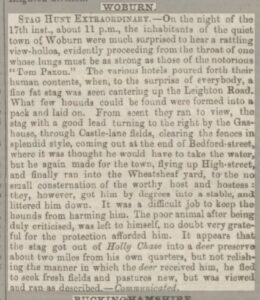
In 1863, Robert Hammond took the licence and saw the house through to its end. The large function room was still being used for auctions and entertainment in the evening, such as this:
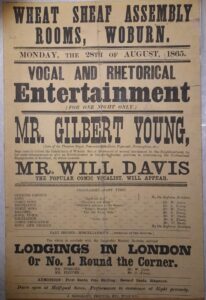
In 1868 Freeman sold the pub and land, together with a number of other houses and pieces of land to the Duke of Bedford for £3,300 [R6/63/4/58]. Interestingly, one of the properties sold was a warehouse in Back Lane (which used to run from the Market Place), built in 1861 on the site of a cottage which had formerly been called the Tavern. This Tavern is first noted in 1585. Presumably the Wheatsheaf was demolished by the Duke soon after he acquired it because it is not shown on the first 25 inches to the mile Ordnance Survey map of 1882.
The Wheatsheaf shown, centre-left, on the deed of 1868. [R6/63/4/58]
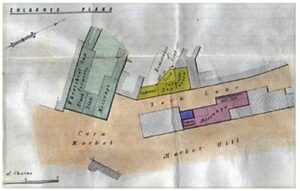
MARKET SQUARE, WOBURN, BEDS. To Brewers, Publicans, and Others. A quantity of BREWING UTENSILS and ALE CASKS WILL BE SOLD BY AUCTION, BY F. WHITLOCK, On Friday the 14th of August, 1868. On the Premises, the Wheat Sheaf Inn, at Three o’clock precisely, THE Property of Mr. W. E. R. Freeman, who has no further use for the same. May be viewed on the morning of sale, and Catalogues obtained of Mr. Clarke, Printer, and of the Auctioneer, Leighton Street, Woburn.
Luton Times 9th March 1872:
We learn that extensive alterations were intended to be made by his Grace the Duke of Bedford, at the Town Hall, Woburn. Hearing of this, a memorial to his Grace is in course of signature by the inhabitants praying for the removal of the old edifice and the erection of a more suitable building on the site of the old Wheatsheaf, by which alone, it is said, sufficient accommodation can be provided for lectures, concerts, readings, etc.
Later that year, the large room at the inn was still being used for events, but tellingly the catering was being provided from elsewhere. Beds Times 28th May 1872:
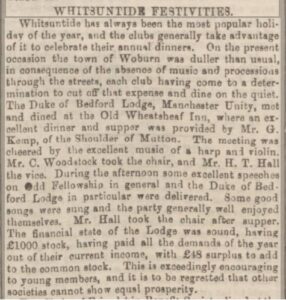
That is the end of the story of the Woburn Wheatsheaf. There was no grand final party or celebration. It may possibly have closed up for the last day without anyone realising it would never open again. It wasn’t demolished immediately. The last landlord, Robert Hammond, went on to run the Heath Hotel (Flying Duck) in Aspley Heath for 1875-1878 where his wife Annie died aged 53 in 1875.
List of Licensees – Note this is not a complete list.
1770: Mark West
1777-1791: John Gostelow
1791-1799: Mary Gostelow
1801-1803: John Gostelow jnr.
1802-1804: George Bull
1804-1821: William Hurley
1821-1836: Maria Hurley
1836-1840: Oliver Baker Croxen (married William & Maria Hurley’s daughter, Lucy)
1840: Lucy Croxen
1840: George Attwood (married Lucy Croxen) & called it “The New Goat & Wheatsheaf”.
1841-1842: Joseph Hurley, son of William & Maria Hurley, brother of Lucy
1844-1850: George Rogers (previously 14 years running The White Bear, Woburn)
1850-1854: William Norris (also maltster, corn dealer and mealman)
1856: Joseph Smith Cook
1861: Rebecca Nash? Marsh?
1861-1867: Peter Nicholl (Kellys 1867?)
1863-1869: Robert Hammond
Page last updated November 2023.
